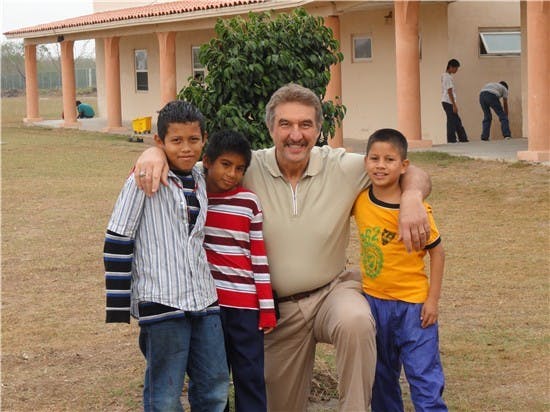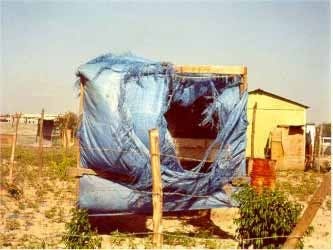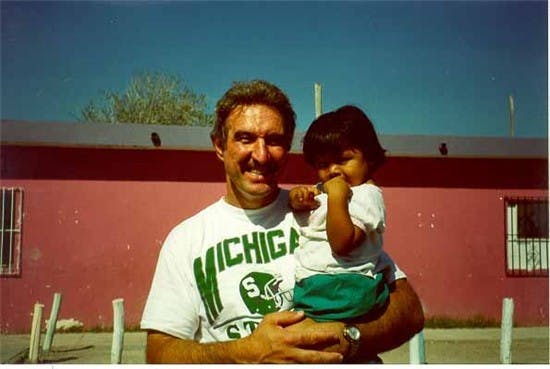Former MSU football defensive lineman John Shinsky played with grit and determination on the field.
Off the field, he was molded into a new man because of his childhood.

Former MSU football defensive lineman John Shinsky helps children during the 2,000 Mile Bike for the Orphanage in 2009. Photo courtesy of John Shinsky.
Former MSU football defensive lineman John Shinsky played with grit and determination on the field.
Off the field, he was molded into a new man because of his childhood.
When Shinsky was 8 years old, his father died from a heart attack. Through the grieving came even more disbelief. With his father gone and his mother the only one left to take care of him, she made the decision to place him in an orphanage.
“I always had in the back of my mind, ‘Oh yeah this is just temporary, I’m going back,’ but after a while it was a reality that — I wasn’t going back,” Shinsky said.
Day after day, he felt confused as to why this happened to him.
“I could never understand why a mother could give up her child and I dealt with that all the way until I took her to my graduation,” he said. “And I realized, that it wasn’t about me, it was about what she did to give me up.”
But now without a family — Shinsky was on his own.
The early years
Shinsky’s mother placed him in an orphanage in Parma, Ohio, located a stone's throw from the city line of south Cleveland.
At the orphanage, he would begin his new life. He went to school and participated in extracurricular sports. He learned the politics of the orphanage — toughest kid rules — and had his daily dose of chores.

But each day was a struggle.
Shinsky wasn’t able to have a chest full of toys to himself like many experience in a regular childhood. The only thing he had to his name was a toothbrush.
Yet overtime, he started to grow physically and develop a determination to succeed.
In 1965, he attended St. Joseph High School, a private all-boys school of about 2,000. Today the name is Villa Angela-St. Joseph High School after it merged with an all-girls school in 1990.
His start to high school was not ideal.
“Coming up as an orphan and feeling like you’re abandoned, you always feel like you have to establish yourself and prove yourself to people, they just don’t automatically accept you like in a regular family,” he said.
Support student media! Please consider donating to The State News and help fund the future of journalism.
In order to establish himself, Shinsky would be involved in physical altercations with other students.
He said that’s how it works at the orphanage — duke it out and get over it. But school didn’t work that way, so Shinsky was suspended and nearly expelled for his behavior.
It was then he was recommended to play sports as a way to release stress and energy. He began to wrestle and play football.
His wrestling coach, lineman coach and health teacher John Storey, instantly recognized Shinsky as a gifted talent.
“He stood out immediately,” Storey said. “Not only in his physical size, but his aggressive type of play.”
At 165 pounds, Shinsky worked in the offseason to get stronger each day.
He said his workouts started with a two mile run, followed with another mile jog and on the field. He would run 100 yard dashes 100 times.
“Determination and hard work for me was the thing that did it,” he said.
His efforts were rewarded his senior season with a record of 10-0-0. However, the strain he put on himself ended with knee surgery, which didn’t affect his collegiate scholarship.
While he clearly chose MSU to play college football, he was recruited and had the opportunity to play under Woody Hayes of Ohio State University and Bo Schembechler of University of Michigan.
“You know what your school is, Michigan State is who I am,” Shinsky said.
In 1973, Shinsky was named All-Big Ten Second Team under former head coach Denny Stolz. Shinsky started at MSU with Duffy Daugherty in charge. Stolz was the defensive coordinator.
One appreciation Shinsky had for Daugherty was he adopted children of his own.
After college football, Shinsky had opportunities to play in the National Football League, however his contract said if he suffered another knee injury, he wouldn't have to be paid and he decided to end his football career.
Years later he was approached by former MSU head coach Nick Saban to help recruit two players from St. Joseph High School. Shinsky said both of those players were leaning toward MSU, but on the last day to sign, they switched to U-M. They were future Super Bowl winners, quarterback Elvis Grbac and the Heisman winner Desmond Howard.
Life after football
Shinsky earned his bachelor's, master's and doctoral degrees at MSU. He helped teach children with special needs and ran a summer camp for children with disabilities in Cleveland. However, the camp didn’t have enough money to pay him, so he worked there for free and worked as a bouncer at night.
“Those are the greatest choices that you will always make in your life,” Shinsky said. “When you choose for people, versus money, versus failure, versus other things.”
He also spent years giving back in the Lansing scene.
Shinsky would bring alternative spring break trips to Mexico to help build housing. When a project went unfinished, he went back with his wife, Cindy, to finish the job on their honeymoon.
“Well, John is like a big teddy bear,” Cindy said. “He’s a big guy, but he has such a big heart and soul and is just a kind person.”
On their honeymoon, Shinsky met another orphan named Amelia, who was found in a Mexican dump, chained to the wheelbase of a car and left to die
“I could just tell she was special,” he said.
Shinsky said the conditions in Mexico were harsh and he wanted to make a change.
“I could see myself in those kids and I could see what was unfolding in them.” Shinsky said. “I knew at that point that was the calling for me.”
The Shinsky Orphanage
Despite few Spanish speaking skills, his location for the orphanage is Matamoros, Mexico, a town up against the Rio Grande River across the border from Brownsville, Texas.

With a plan in place, he needed the money to get it going.
For a leap of faith, Shinsky took $4,000 and invested it into a penny stock — which hit — turning into $65,000.
While plans were coming together, he was stricken down once again. In his neck, a cancerous tumor was discovered.
But he wouldn’t let his setback derail his goal.
“The orphanage project, I’m going to take it on no matter what, I’m going to do whatever it takes to get it done,” he said. “In whatever amount of time it takes to get done I’m going to get it done, because I have a goal and my goal is to get my kids an education.”
To him, failure wasn’t an option.
“If we don’t do it – who does?” he said.
For the final amount of money and the opening of the orphanage, Shinsky along with two friends and former MSU teammates, Joe DeLamielleure and Eljay Bowron, began a new physical journey.
DeLamielleure is one of three MSU football players to be in the National Football League Hall of Fame after a successful career with the Buffalo Bills.
Instead of hitting opponents, the trio embarked on a bike trip from Spartan Stadium to Matamoros, a trip for nearly 1,700 miles that lasted 18 days.
“If you knew John as a freshman and how he is now,” DeLamielleure said in a previous article by The State News. “I described him as a lump of coal and now he’s a diamond. He has come farther than any human being I’ve ever met.”
Shinsky was able to collect the remaining $500,000 needed to open a 17-acre orphanage.
“He’s just such a wonderful role model,” Cindy said. “He walks the walks, he talks the talk and he is just a genuine awesome person.”
The orphanage today
From the opening in 2005, to 2012, the “Ciudad de Los Niños,” or the City of Children, has grown from nine children to more than 80.
Their facilities include bunk beds donated from the MSU Surplus Store and full-time staff members are working to build fences and keep conditions to a high standard.
The orphanage is a partner with Nuestros Pequeños Hermanos, or NPH, which translates to “Our little brothers and sisters.” NPH was founded in 1954 and serves more than 18,000 children in nine countries.
The children of Cuidad de Niños attend school and have daily chores to become contributors to the orphanage.
Since its opening, there have been nine high school graduates with multiple children attending universities. One particular graduate, Leslie, whose name was changed to protect their identity according to the NPH website, was valedictorian of Nuestros Pequeños Hermanos High School in Cuernavaca, Mexico.
Shinsky said education was the path for orphans in order to integrate to society. With an education, members of the orphanage could become successful members in the community. His hope is that each orphan goes on after graduation and takes with them a humanitarian interest to give back. Each graduate goes through a year of service at an orphanage before attending a university.
Shinsky said a graduate named Noe told him, "I want to build a home just like John and Cindy built for our kids,” which provided complete admiration and satisfaction.
Today the orphanage has some dangers surrounding them with the drug cartels in Mexico. Shinsky said they build walls up slowly, so members of the cartel think nothing is important inside.
Shinsky said the former Director of the Secret Service gave advice on how to stay safe.

“In relation to Mexico, I just know I’m in an environment that has danger,” Shinsky said.
One employee for the orphanage experienced a run in with the cartel in San Fernando, Mexico, which is known for two massacres in 2011 and 2012.
Shinsky said the employee was on his way to pick up a child for the orphanage, when he was stopped and stripped of his possessions. He said the employee told him he was helping orphans, which is why his life was spared.
He doesn’t live at the orphanage full time. When he visits, he stays there, however currently Shinsky is a professor and interim special assistant to the dean of community impact at Grand Valley State University.
Soon he will take the position of vice chair of NPH National Board located in Chicago.
During his life, Shinsky has obtained several different awards.
“The awards really don’t mean anything to me, they’re just things that recognizes what everyone has done but there is one particular award that I take great pride in and I think Michigan State should take great pride in because they are the ones who have nurtured this to, I have become who I am because of them,” he said.
Although at MSU he was named an Academic All-American, with the success of the orphanage, Shinsky was awarded the 2015 Dungy-Thompson Humanitarian Award. The award recognizes Big Ten football players who have achieved success in the areas of leadership and humanitarianism after their college careers have ended.
“At one point in my life I didn’t even know where I was going and in this point in life — I’m pleased to where I’ve gone,” he said.
His future goals are to continue a successful orphanage and he said he hopes his legacy can inspire more people to give back.
“The one thing I learned about legacy, people always talk about legacy, ‘Legacy is not really what I left … in my mind legacy is what is lived through other people,’” he said.
To donate, visit shinskyorphanage.org.